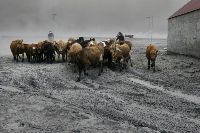
Farmers across the region where the volcano erupted this week under the Eyjafjallajokull glacier have been scrambling to protect their herds from inhaling or ingesting the ash, which can cause internal bleeding, long-term bone damage and teeth loss.
Near Skogar, south of the volcano, the ash blew down from the mountain, blotting out the sunlight and covering everything - pastures, animals and humans - in a thick, gray paste.
Berglind Hilmarsdottir, a dairy farmer, teamed up with neighbors Saturday to round up her cattle, some 120 in all, and get them to shelter. In the panic, some of the animals got lost in the fog of ash, and the farmers had to drive around searching for them.
"The risk is of fluoride poisoning if they breathe or eat too much," Hilmarsdottir said through a white protective mask.
The fluoride in the ash creates acid in the animals' stomachs, corroding the intestines and causing hemorrhages. It also binds with calcium in the blood stream, and after heavy exposure over a period of days makes bones frail, even causing teeth to crumble.
Fluoride: Worse than We Thought
"The best we can do is put them in the barn, block all the windows and bring them clean food and water as long as the earth is contaminated," said Hilmarsdottir.
The volcanic ash, which has spread over Europe to bring air travel to a near standstill for days, has not settled in other countries in any great quantities. It gets thinned out and blown to high altitudes by the wind, threatening to knock out jet engines with its abrasiveness, but is not expected to endanger those countries' human or animal populations.

On the north side of the volcano, a valley hit by violent floods but so far spared from the ash fall, 33-year-old sheep farmer Anna Runolfsdottir was preparing for the worst - that the wind direction could change and spread the ash over more land, including hers.
It's lambing season, and she expects between 60 and 100 newborns this spring. But if the ash hits her farm, their survival would be uncertain.
"The animals like the salty taste of it, so even if there's just a bit they will be in danger," she said, cradling a lamb while the huge plume of smoke towered in the distance. The problem is not a new one for the farm, which she grew up on and eventually inherited.
In 1947, another volcano erupted further north and the farm was hit. More than 60 years later, some of the ash still scars her back yard, leaving a grass-less patch of black sand.
"In Iceland you live with such things," she said. "But we didn't expect a big one like this."



Reader Comments
to our Newsletter